The multi-serving snack bags packaging market, valued at 6.7 USD billion in 2025, is projected to reach 12.5 USD billion by 2035, reflecting a CAGR of 6.4% over the period. The market maturity curve shows early adoption during 2020–2024, with annual growth from 4.9 to 6.3 USD billion, as manufacturers test flexible and convenient packaging formats. By 2025, adoption begins scaling, driven by demand for portion-controlled packaging across snacks and convenience foods.
Between 2025–2030, the market grows from 6.7 to 9.1 USD billion, reflecting wider deployment, optimized production lines, and increasing consumer acceptance. From 2030–2035, growth moderates as consolidation occurs, with established suppliers capturing the majority of demand. The adoption lifecycle mirrors this trajectory. During 2020–2024, early adopters validate packaging reliability, shelf life, and logistics efficiency, creating reference cases for broader uptake.
From 2025–2030, scaling occurs as mainstream manufacturers expand installations, streamline production, and standardize procurement contracts. By 2030–2035, consolidation dominates: late entrants follow proven packaging models, partnerships and mergers shape competitive dynamics, and procurement focuses on cost efficiency and operational consistency. The market transitions from experimental adoption, through rapid scale-up, to a mature phase with predictable demand, standardized processes, and established supplier relationships.
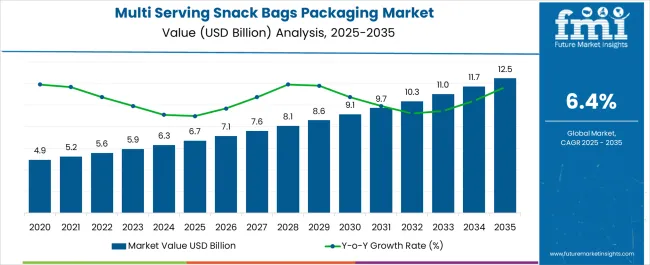
| Metric | Value |
|---|---|
| Multi Serving Snack Bags Packaging Market Estimated Value in (2025 E) | USD 6.7 billion |
| Multi Serving Snack Bags Packaging Market Forecast Value in (2035 F) | USD 12.5 billion |
| Forecast CAGR (2025 to 2035) | 6.4% |
Data shows that Q3 and Q4 account for 35–40% of annual orders, aligning with summer snacking and year-end holiday promotions. Conversely, Q1 typically records 10–15% lower procurement, as manufacturers adjust inventories post-holiday season. Seasonal promotions and limited-edition flavors often create short-term spikes of 10–15% above baseline demand. Suppliers plan production, packaging, and logistics schedules around these peaks to maintain a steady supply and meet retailer timelines while avoiding overproduction during lower-demand periods. Cyclicality in this market reflects broader manufacturing investment and capacity expansion patterns. Packaging lines are generally upgraded or expanded every 5–7 years, generating periodic surges that can increase annual market size by USD 0.5–1 billion.
Regulatory changes, packaging standards, or shifts in raw material availability can also temporarily accelerate demand, producing short-term spikes of 5–10% above projected growth. These cycles overlay the underlying CAGR of 6.4%, producing alternating periods of rapid adoption and moderate stabilization. Recognizing these patterns allows manufacturers and suppliers to optimize production schedules, inventory management, and procurement timing.
Manufacturers are focusing on packaging formats that balance durability, product freshness, and consumer convenience. The sector is witnessing an increased emphasis on shelf appeal, lightweight materials, and enhanced barrier properties to extend product shelf life.
Advancements in printing technology and customization are further influencing brand differentiation in competitive retail environments. While environmental considerations are prompting research into sustainable alternatives, conventional packaging materials continue to dominate due to cost-effectiveness and performance reliability.
Increasing penetration of organized retail and e-commerce channels has also amplified the demand for protective and attractive packaging formats that can withstand varied storage and transportation conditions. The market is expected to sustain its growth trajectory, supported by innovations in material science, consumer lifestyle changes, and the strategic expansion of packaged food brands in both developed and emerging economies.
The multi serving snack bags packaging market is segmented by type, material type, size, application, and geographic regions. By type, multi serving snack bags packaging market is divided into Non-biodegradable and Biodegradable. In terms of material type, multi serving snack bags packaging market is classified into Plastic and Paper & paperboard. Based on size, multi serving snack bags packaging market is segmented into Small, Medium, and Large.
By application, multi serving snack bags packaging market is segmented into Savoury snacks, Bakery & confectionery, Nuts & dried fruits, Healthy snacks, and Others. Regionally, the multi serving snack bags packaging industry is classified into North America, Latin America, Western Europe, Eastern Europe, Balkan & Baltic Countries, Russia & Belarus, Central Asia, East Asia, South Asia & Pacific, and the Middle East & Africa.
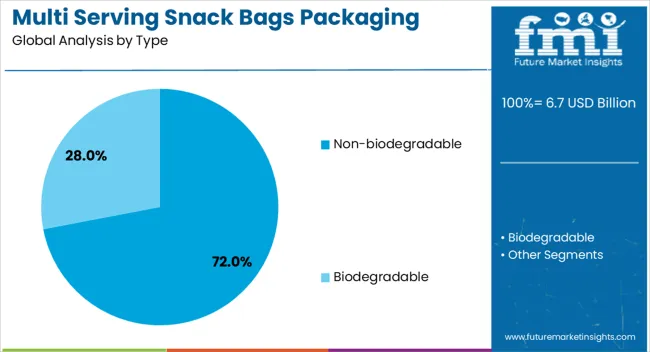
The non-biodegradable segment is expected to hold 72% of the multi-serving snack Bags Packaging market revenue share in 2025, making it the leading type segment. This dominance has been influenced by the superior durability, moisture resistance, and cost efficiency offered by non-biodegradable materials. Their ability to provide strong protective barriers against oxygen, light, and humidity ensures product freshness over extended periods.
Additionally, these materials support high-quality printing and design flexibility, enabling enhanced branding and shelf visibility. The extended storage capability of non-biodegradable packaging has been particularly valued in global snack distribution, where long transit times and varied climatic conditions are common.
Moreover, established manufacturing processes and extensive availability have contributed to their widespread adoption. Although sustainability concerns are driving research into alternatives, the combination of affordability and proven performance continues to position non-biodegradable materials as the preferred choice for high-volume snack packaging applications.
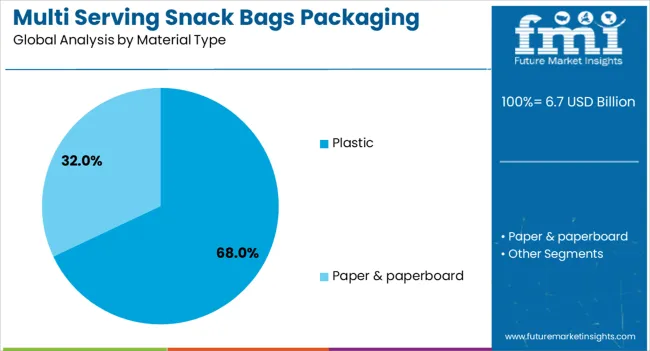
The plastic segment is projected to account for 68% of the multi-serving snack Bags Packaging market revenue share in 2025, making it the leading material type. Growth in this segment has been supported by the versatility, lightweight properties, and strong barrier performance of plastics in preserving snack quality. The adaptability of plastic materials allows manufacturers to create varied sizes and formats, catering to different consumer needs while maintaining cost efficiency in production and distribution.
The ease of sealing and forming plastic films ensures reliable packaging integrity, which is essential for maintaining product safety and freshness. Plastic packaging also supports vibrant printing and branding opportunities, which are critical in influencing consumer purchase decisions.
The wide availability of raw materials and established processing infrastructure further sustains its dominance While environmental regulations are gradually influencing material selection, the current performance and affordability of plastics continue to secure their leadership position in this market.
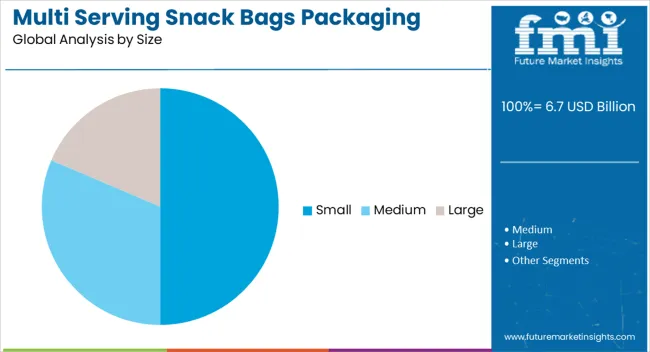
The small size segment is estimated to hold 50% of the multi-serving snack bags packaging market revenue share in 2025, making it the leading size category. This leadership has been attributed to the rising consumer preference for compact, portable snack packs that offer portion control and on-the-go convenience. Small-sized multi-serving bags are widely used in households, offices, and travel scenarios due to their ease of storage and handling.
The format aligns with shifting consumption patterns, where consumers seek variety and reduced food waste while maintaining freshness across multiple servings. Retailers and brands favor small-sized packaging for its shelf efficiency and appeal to budget-conscious buyers who prefer smaller quantities at affordable price points.
Additionally, the reduced material usage in smaller packages contributes to cost savings in production and transportation. As lifestyles become increasingly mobile and snack consumption rises, the small-size segment is expected to retain its market advantage through consistent demand across both developed and emerging regions.
The multi-serving snack bags packaging market is growing due to rising consumer demand for convenient, portion-controlled, and resealable packaging solutions. Snack brands are expanding product lines in chips, nuts, cereals, and confectionery to cater to households and on-the-go consumption. North America and Europe lead adoption due to high snack consumption, while Asia-Pacific is expanding rapidly. Manufacturers focus on barrier properties, ease of use, sustainability, and eye-catching design to enhance shelf appeal, freshness, and consumer convenience.
Multi-serving snack bags cater to households and shared consumption by providing larger packages with resealable features, maintaining product freshness over multiple servings. Consumers prefer packaging that is easy to open, reseal, and store, particularly for snacks consumed at home or during travel. Resealable zippers, tear notches, and stand-up pouches enhance usability. Manufacturers emphasizing convenience-oriented features gain preference among busy households and working professionals. Until alternative packaging formats offer the same combination of resealability, portion management, and convenience, multi-serving bags will remain critical for meeting evolving consumer lifestyles and preferences.
Maintaining snack freshness is vital for consumer satisfaction and brand loyalty. Multi-serving bags often incorporate high-barrier films, moisture-absorbing layers, and oxygen-scavenging technologies to prevent staleness and spoilage. Proper barrier properties ensure products retain taste, texture, and aroma for extended periods. Snack manufacturers prioritize packaging solutions that extend shelf life without compromising recyclability or aesthetics. Until alternative packaging solutions achieve comparable freshness preservation and cost efficiency, multi-serving snack bags will remain essential for protecting product quality while ensuring consumer trust in packaged snacks.
Multi-serving snack bags offer opportunities for branding, product differentiation, and promotional messaging. Larger surface areas allow eye-catching designs, nutrition information, and seasonal or limited-edition campaigns. Packaging influences purchase decisions in retail settings, particularly in supermarkets and convenience stores. Manufacturers that provide customizable, high-quality printability and attractive finishes gain a competitive edge. Until alternative packaging formats offer equivalent visual impact, consumer engagement, and brand visibility, multi-serving snack bags will remain a preferred solution for maximizing shelf presence and driving repeat purchases in the competitive snack market.
Increasing environmental awareness has pushed manufacturers to adopt recyclable, compostable, or reduced-plastic multi-serving bags. Packaging must balance barrier performance, durability, and compliance with regional food safety and labeling regulations. Innovations in bio-based films, laminated materials, and minimalistic designs help brands meet regulatory and consumer expectations. Until alternative eco-friendly packaging achieves the same combination of freshness protection, functionality, and cost-effectiveness, multi-serving snack bags with sustainable materials will continue to dominate the market, satisfying both regulatory requirements and growing consumer demand for environmentally responsible products.
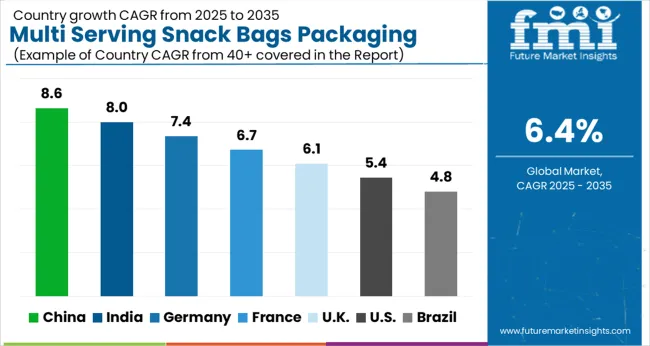
| Country | CAGR |
|---|---|
| China | 8.6% |
| India | 8.0% |
| Germany | 7.4% |
| France | 6.7% |
| UK | 6.1% |
| USA | 5.4% |
| Brazil | 4.8% |
The global multi serving snack bags packaging market is projected to grow at a CAGR of 6.4% through 2035, supported by increasing demand across food, confectionery, and retail packaging applications. Among BRICS nations, China has been recorded with 8.6% growth, driven by large-scale production and deployment in snack and food packaging facilities, while India has been observed at 8.0%, supported by rising utilization in retail and packaged food sectors. In the OECD region, Germany has been measured at 7.4%, where production and adoption for food, confectionery, and retail packaging applications have been steadily maintained. The United Kingdom has been noted at 6.1%, reflecting consistent use in snack and packaged food packaging, while the USA has been recorded at 5.4%, with production and utilization across food, retail, and confectionery packaging sectors being steadily increased. This report includes insights on 40+ countries; the top five markets are shown here for reference.
The multi serving snack bags packaging market in China is expanding at a CAGR of 8.6%, driven by the increasing demand for convenient, ready-to-eat snack packaging. Rising urbanization, changing lifestyles, and a growing middle-class population are accelerating adoption of multi serving snack bags across retail and foodservice sectors. Manufacturers are investing in resealable, multilayer, and high-barrier packaging solutions to maintain freshness and extend shelf life. Technological innovations in automated packaging, labeling, and smart monitoring are further improving operational efficiency. E-commerce expansion and modern retail growth also contribute to market growth. Environmental concerns are encouraging adoption of sustainable and recyclable packaging materials. Government regulations supporting food safety, hygiene, and waste management enhance market potential. With a combination of consumer demand, technological innovation, and regulatory support, China is poised to remain a significant growth market for multi serving snack bags packaging.
The multi serving snack bags packaging market in India is growing at a CAGR of 8.0%, supported by rising consumption of packaged snacks and ready-to-eat foods. Urbanization, changing lifestyles, and increasing disposable incomes are driving demand for hygienic, convenient packaging solutions. Manufacturers are implementing multilayer films, resealable bags, and high-barrier packaging to extend shelf life and maintain product quality. Technological advancements in automated packaging lines, smart labeling, and eco-friendly materials further enhance market efficiency and appeal. Growth in organized retail, supermarkets, and e-commerce platforms is expanding accessibility and adoption. Government regulations emphasizing food safety, packaging standards, and sustainability encourage investment in modern packaging solutions. With increasing awareness about hygiene, convenience, and eco-friendly packaging, India presents a robust growth opportunity for multi serving snack bags packaging.
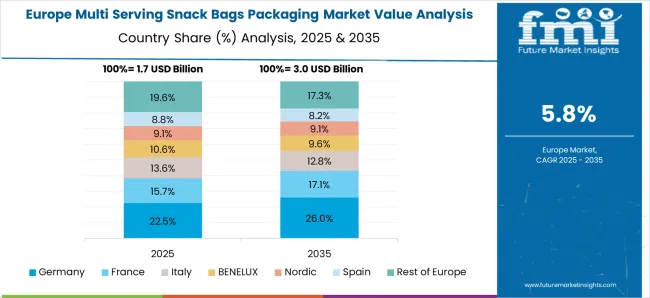
The multi serving snack bags packaging market in Germany is growing at a CAGR of 7.4%, driven by demand for hygienic, convenient, and sustainable snack packaging solutions. Rising consumption of packaged and ready-to-eat snacks in urban areas, along with the growth of retail and e-commerce channels, supports market expansion. Manufacturers are adopting advanced multilayer films, resealable bags, and eco-friendly materials to maintain product freshness and extend shelf life. Automation, smart labeling, and innovative sealing technologies improve production efficiency and operational flexibility. Germany’s strict regulations on food safety, packaging sustainability, and waste management encourage investment in modern packaging solutions. Consumer preference for convenience, hygiene, and environmentally friendly packaging is further boosting demand. The combination of technological innovation, regulatory support, and changing consumer habits ensures steady growth of the multi serving snack bags packaging market in Germany.
The multi serving snack bags packaging market in the United Kingdom is growing at a CAGR of 6.1%, fueled by demand for convenient, ready-to-eat snacks. Urban lifestyles, busy consumer schedules, and rising snack consumption drive adoption across retail and foodservice sectors. Manufacturers are deploying resealable bags, multilayer films, and high-barrier packaging to ensure freshness and extend product shelf life. Sustainability initiatives encourage the use of recyclable, eco-friendly materials. Growth in e-commerce and organized retail enhances market penetration. Government regulations on food safety, hygiene, and environmental responsibility further support adoption. With technological advancements in automated packaging, smart labeling, and sustainable materials, the UK market is positioned for consistent growth. The combination of consumer convenience preferences and regulatory incentives ensures steady expansion of multi serving snack bags packaging in the country.
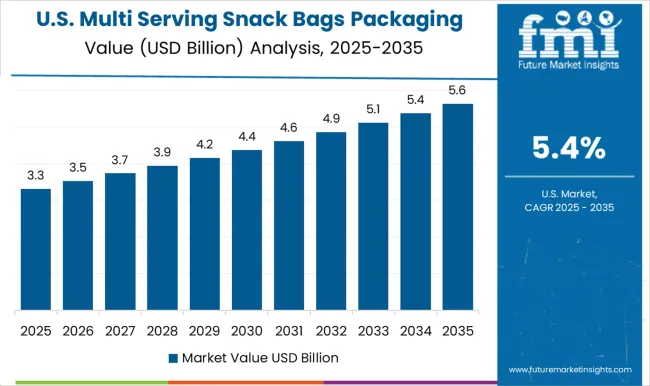
The multi serving snack bags packaging market in the United States is expanding at a CAGR of 5.4%, driven by increasing consumption of packaged, ready-to-eat snacks. Consumers are seeking hygienic, convenient, and portion-controlled packaging solutions, boosting demand across retail and foodservice industries. Manufacturers are adopting multilayer films, resealable bags, and high-barrier materials to preserve freshness and ensure longer shelf life. Technological innovations, including automated packaging lines, smart labeling, and eco-friendly materials, enhance operational efficiency and sustainability. E-commerce growth and modern retail expansion further accelerate adoption. Regulatory emphasis on food safety, packaging compliance, and environmental sustainability encourages innovation and investment. With evolving consumer preferences toward convenience, hygiene, and environmentally conscious packaging, the United States market for multi serving snack bags packaging is poised for steady growth.
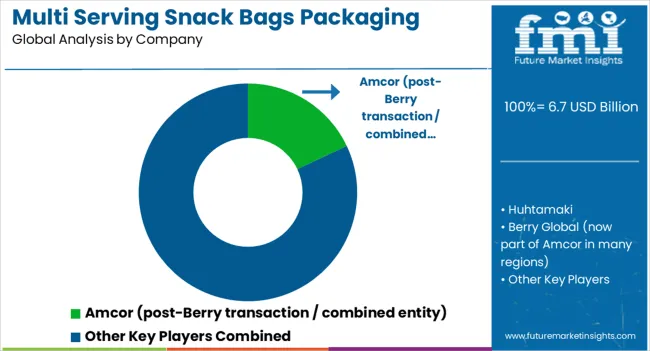
Innovations in barrier films, resealable closures, and recyclable materials are key trends shaping the market. Amcor, following its Berry Global acquisition in several regions, is a leading supplier, offering high-performance, multi-layered packaging solutions for chips, nuts, and other snack products. Huhtamaki specializes in flexible packaging with an emphasis on sustainable and renewable materials, catering to growing consumer and regulatory demands.
Mondi provides innovative, customizable packaging solutions for multi-serving snack bags, combining convenience, protection, and printability. Sonoco delivers advanced packaging systems that focus on product freshness, strength, and consumer usability. Sealed Air is known for its protective and flexible packaging solutions that reduce food waste and enhance shelf appeal. Smaller regional players are also contributing with niche solutions such as biodegradable films, stand-up pouches, and resealable snack bags that meet evolving consumer preferences. With sustainability, convenience, and product protection at the forefront, multi-serving snack bag packaging is becoming a critical segment within the broader flexible packaging market, offering manufacturers the ability to combine performance with eco-conscious design.
| Item | Value |
|---|---|
| Quantitative Units | USD 6.7 Billion |
| Type | Non-biodegradable and Biodegradable |
| Material Type | Plastic and Paper & paperboard |
| Size | Small, Medium, and Large |
| Application | Savoury snacks, Bakery & confectionery, Nuts & dried fruits, Healthy snacks, and Others |
| Regions Covered | North America, Europe, Asia-Pacific, Latin America, Middle East & Africa |
| Country Covered | United States, Canada, Germany, France, United Kingdom, China, Japan, India, Brazil, South Africa |
| Key Companies Profiled | Amcor (post-Berry transaction / combined entity), Huhtamaki, Berry Global (now part of Amcor in many regions), Mondi, Sonoco, and Sealed Air |
| Additional Attributes | Dollar sales by type including plastic pouches, laminated films, and paper-based bags, application across chips, nuts, confectionery, and baked snacks, and region covering North America, Europe, and Asia-Pacific. Growth is driven by rising demand for convenient packaging, increasing snack consumption, and focus on product freshness and sustainability. |
The global multi serving snack bags packaging market is estimated to be valued at USD 6.7 billion in 2025.
The market size for the multi serving snack bags packaging market is projected to reach USD 12.5 billion by 2035.
The multi serving snack bags packaging market is expected to grow at a 6.4% CAGR between 2025 and 2035.
The key product types in multi serving snack bags packaging market are non-biodegradable and biodegradable.
In terms of material type, plastic segment to command 68.0% share in the multi serving snack bags packaging market in 2025.






Full Research Suite comprises of:
Market outlook & trends analysis
Interviews & case studies
Strategic recommendations
Vendor profiles & capabilities analysis
5-year forecasts
8 regions and 60+ country-level data splits
Market segment data splits
12 months of continuous data updates
DELIVERED AS:
PDF EXCEL ONLINE
Multichannel Order Management Market Forecast and Outlook 2025 to 2035
Multiexperience Development Platform Market Forecast and Outlook 2025 to 2035
Multi Depth Corrugated Box Market Size and Share Forecast Outlook 2025 to 2035
Multi Attachment Loaders Market Size and Share Forecast Outlook 2025 to 2035
Multi Pocket Holders Market Size and Share Forecast Outlook 2025 to 2035
Multi-Screen Super Glass Market Size and Share Forecast Outlook 2025 to 2035
Multichannel Reagent Reservoir Market Size and Share Forecast Outlook 2025 to 2035
Multi-Functional Point Of Care Testing Market Size and Share Forecast Outlook 2025 to 2035
Multi-layer Film Recycling Market Size and Share Forecast Outlook 2025 to 2035
Multifunctional Household Robot Market Size and Share Forecast Outlook 2025 to 2035
Multistage Ring Section Pumps Market Size and Share Forecast Outlook 2025 to 2035
Multi-photon Microscopic System Market Size and Share Forecast Outlook 2025 to 2035
Multi-axis Truss Robot Market Size and Share Forecast Outlook 2025 to 2035
Multi-Axis PCB Drilling Machine Market Size and Share Forecast Outlook 2025 to 2035
Multi-Modal Biometric Cabin Sensors Market Analysis - Size, Share, and Forecast Outlook 2025 to 2035
Multivitamin-Infused Skincare Market Analysis - Size, Share, and Forecast Outlook 2025 to 2035
Multi Touch Sensing Market Size and Share Forecast Outlook 2025 to 2035
Multiplex PCR Assays Market Size and Share Forecast Outlook 2025 to 2035
Multi-fulcrum Suspension Crane Market Size and Share Forecast Outlook 2025 to 2035
Multiparameter Patient Monitoring Systems Market Size and Share Forecast Outlook 2025 to 2035

Thank you!
You will receive an email from our Business Development Manager. Please be sure to check your SPAM/JUNK folder too.
Chat With
MaRIA